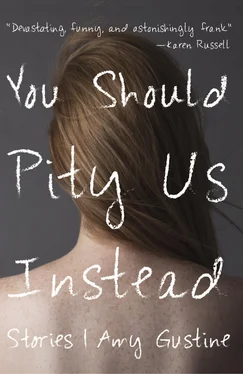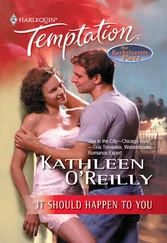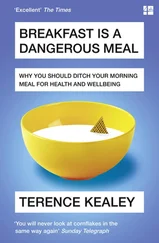Sarah claims her mother is in town staying with an old friend. “I’ll go over there Christmas Day.”
“Okay, then I’m going to give you your present now.”
It’s a gift certificate to Williams-Sonoma.
“You’re such a great cook. I’m sure you can find something you’ll love there.”
Christmas morning Bea shakes Sarah, who pretends to be groggy, though in fact she’s been lying awake for an hour.
“Come on, Santa came! Santa came!” Bea pulls at her arm, but Sarah sends her off.
“I’ll be down. I have to go to the bathroom.”
She listens to the baby’s cry, Bea’s cheerful shouts and Melanie and Aaron’s muttered permissions. The scent of pancakes and bacon, the only two things Aaron can cook, reach her.
At eight Sarah dresses quietly and slips out of the house. First the bus to the Catholic church on Cornish, two warm Masses, then two rides around town, switching every twenty minutes so the driver doesn’t get suspicious, and an early dinner at the Chinese restaurant on Passe Road, the only place open on Christmas Day. From there it’s a two-mile walk back to the Cuppernell’s.
The house is dark, as Sarah expected, Aaron, Melanie and the kids having gone to her parents’ for dinner.
Sarah gets out the pan she bought at Williams-Sonoma, the important one. Her mother owned its twin, the words “All-Clad” engraved on the handle. She had the small saucepan and a stockpot too, but these were indulgences. “The only pan that really has to be top quality is the large sauté,” her mother explained, “so your meat and fish sear evenly and you can scrape the fond off with a metal spatula. Never use non-stick for this. No good. You can’t get the fond.” Her mother showed her how to polish the pans with a white powder and hang them on a rack above the sink in their mint-green kitchen.
Sarah isn’t hungry, but defrosts a chicken breast anyway and while it sizzles, wonders where the pans ended up. She never thought to ask for them. Then again, she was ten when her mother died and a month passed before her foster parents said anything. By that time, the pans were probably long gone.
The chicken is perfect, browned without burning, juicy in the middle. Sarah wraps it up, then polishes her pan with the powder the saleswoman recommended. She hadn’t recalled its name or what the label looked like. She knows this is the right stuff, though, because the pan shines, brand-new again.
The Saturday after New Year’s Sarah has an appointment to see an apartment and Melanie insists on driving her. She’s long since discovered Sarah has no car.
Stained tan carpeting, white walls. It’s another holding cell, like the bedrooms she slept in as a foster child, but it’s partially furnished with a leather couch, bedframe, table and chairs, and the rent is the same as her old place.
“Furnished?” Melanie sneers, turning to Sarah. “Did you want furnished?”
The landlord, a skinny guy wearing yellow pants, loses interest. No sale here.
On the drive home Melanie pulls into another place with a “Units Available” sign out front. Much newer, the complex is set back from the road behind a rolling lawn. The cars line up, protected from the light snow by a long peaked roof. White numbers reserve each spot.
They look at a one-bedroom. It has floors Sarah thinks are wood, but Melanie informs her it’s “just laminate. Looks nice for an apartment, though.”
The pan could hang here. And she’d keep her laundry quarters in a bag in this drawer. Except it costs three times her old place.
Sarah says she’ll think about it. Feeling the need to justify her delay, she claims to be saving for a car.
On the way home Melanie asks if she knows anything about cars.
“No,” Sarah admits.
Melanie smiles. “I’ve got just the man for you, then.”
Within a week Judge Cuppernell has found a used Civic thirty miles away and he’s coming to get Melanie and Sarah to look at it. They ride south on a blustery Sunday in the Judge’s Suburban. Melanie is laughing because Aaron has never been alone for this long with both kids. “Can you believe it? He’s just going to die.”
Her father seems to find this just as funny. “That poor guy. Fathers really have it tough these days.”
Melanie slaps him playfully on the arm. “Oh right, tough. Really tough. How about grandfathers? Have you ever even changed a diaper?”
The Judge laughs. “Avoiding that is one of my main goals in life.”
The Judge looks under the hood and examines the tires, asks questions of the owner, a Hispanic man with a goatee, then has Sarah start up the car and gun the engine. “No blue smoke,” he says, taking her place in the driver’s seat. “Let’s take it for a spin.” As they drive the Judge explains what he’s testing for — alignment, noisy brakes, stopping distance — then pulls over and tells Sarah to take the wheel. “Let’s get on the expressway. See if you feel comfortable with the acceleration.”
As they pull back into the seller’s driveway, the Judge says, “It seems pretty solid to me, and these have good safety crash ratings, for their age anyway. I want you to take it in, though, and make sure the airbags check out.” He gives her the name of a mechanic he trusts.
Sarah swallows hard as she writes the check. Five thousand dollars. Nearly her entire life’s savings. She’s close to tears, but that’s not why.
She doesn’t go back to the furnished place Melanie sneered at or the complex with the rolling lawn. She finds a place with carpet not as stained and nothing by way of furnishings except a smelly chair in the bedroom. Sarah moves in early February, taking delivery of a brand-new mattress which she puts on a metal frame scored at Goodwill, where she also bought sheets, a blanket, dishes, and silverware. She’s started from scratch before, knows the priorities.
Melanie gives her the yellow couches from the sunroom.
“They were my mom’s. I’ve been looking for an excuse to get rid of them so her feelings won’t be hurt. If you take them, she’ll be happy and I can get something I like. I mean, don’t feel you have to keep them. As soon as you find something better, just toss them.”
Sarah spends the last of her savings paying two guys from her old apartment complex to haul the couches up and heave the stranger’s chair in the dumpster. Watching it go over the edge — gone, forget it, she doesn’t need it — is exhilarating.
Now that Sarah has a car, Melanie begins leaving her money to buy groceries. She tries new vegetables and spices every week, makes casseroles from recipes rather than remainders. One day she goes to a store that sells nothing but fish because she’s going to try making seafood paella, a recipe she found in one of Mrs. Cuppernell’s old cookbooks. At the counter she explains to Bea why the fish are on beds of ice and what “deveined shrimp” means.
On the way home they pass Melanie’s school. It’s lunchtime and the students are out playing, so Sarah texts Melanie, who brings them in to see her classroom. While Bea looks around and Grayson dozes in the stroller, Melanie and Sarah stand at the window.
“Is that him?”
Ethan stands alone against the building, his thick, uncombed hair snagged on its bricks, trying to feign preoccupation with a stick, though it’s painfully obvious he’s just standing, excluded from four-square, basketball, the climbing wall, the monkey bars.
“The way he acts, nobody likes him,” Melanie says. “It’s heartbreaking.” She goes over to help Bea feed the fish.
Ethan twirls the stick like a baton, scraping his fingers on its rough bark. He examines his hand, rubs the pain away, then begins rolling the stick against the building, trying to sand it smooth, until one of the playground monitors, a surly woman in a bright yellow jacket, tells him to quit. Sarah can’t hear every word, but it’s clear she’s telling him he’ll damage the building and Ethan is pleading his case: it’s just a stick against brick. The monitor shakes her grumpy face and points to the ground. Ethan throws the stick down and walks several feet away, to stand behind the trunk of a massive oak. The woman yells something else and he sulks back toward her, forced to take up a position in full view of the other kids.
Читать дальше












